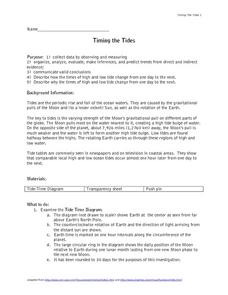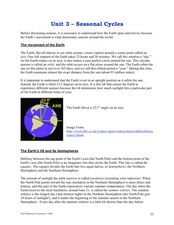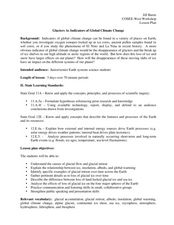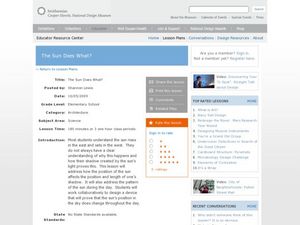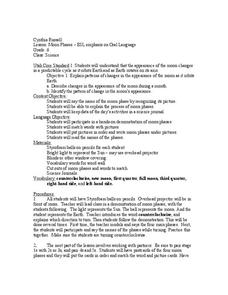Curated OER
Timing the Tides
Students collect data and describe how and why the high and low tides change from day to day. In exploring tides activity students study tides by taking notes, recording data and analyzing their findings.
Curated OER
It's a bright and beautiful day...Protect Yourself!
Learners investigate the cause and effect of skin cancer. They complete worksheets, view presentations and discuss the various types of ultraviolet rays and their impact on human health.
Curated OER
Adding the Moon: Using a Playground Model to Explore the Movement of the Sun, Earth, and Moon
Young scholars experience the rotation of the Earth and the Moon, and the revolution of the Moon around the Earth using a playground model.
Curated OER
Orientation of the Earth in Space
Students hypothesize the location of the sun in the sky at diferent times of day and at different latitudes. They perform several experiments to provide evidence for their hypothesis. Experiments including observing the sun's position at...
Curated OER
Learning Lesson: The Shadow Knows II
Students discover and practice how to calculate the circumference of the Earth. They measure the length of their shadows and use the distance they are away from the equator to complete the calculations. They discuss winter or summer...
Florida International University
Design Your Own
Apply scientific principles to designing an experiment to study organisms living on the coral reef in our oceans. Through reading, individuals learn about the coral reef ecosystem and important factors that affect its function. Using the...
American Museum of Natural History
Journey to the Stars
Fifteen detailed pictures and informative captions delve deep into the exploration of stars—their life cycle and importance in the universe.
Curated OER
Three Clouds Activity
Students understand how clouds are formed. In this cloud lesson, students participate in three experiments to make clouds. Students complete activity sheets for each experiment.
Curated OER
The Solar System: Go Green with the Sun!
Third graders learn how to use solar power. In this sun, technology and energy instructional activity, 3rd graders learn how the solar power from the sun can give off energy, learn about solar panels, discuss their uses and benefits,...
Curated OER
Phase to Phase with the Moon
Fourth graders study the Moon phases. The instructional activity includes hands-on activities as well as web-based activities. They use models of the Moon and a lamp to study each of the phases of the Moon, and test their knowlege of the...
Curated OER
Seasonal cycles
Students understand that the rotation of the Earth is responsible for the seasons. In this seasonal cycles instructional activity, students learn how the rotation of the Earth affects the seasons. Students answer questions about the...
Curated OER
Classroom Meteorologists: An Experiential Approach to Learning about Seasons and Weather
Students examine several concepts about weather in the seven lessons of this unit. This year long activity helps students to gather data seasonally about wind, clouds, precipitation, and temperature. Earth's three climate zones are...
Curated OER
Glaciers As Indicators of Global Climate Change
Students research about glacial ice melting on the four major spheres of the Earth. In this earth science lesson, students explain how this process relates to global warming. They create a presentation and share their findings with the...
Curated OER
Geological Features: How Weathering & Erosion Help Create Landforms
Students explore how the Earth's surface changes resulting in geological features and landforms. They perform a read-a-loud on Thomas
Locker's Mountain Dance, complete a KWL chart, and create a
landform using plaster of paris.
Curated OER
Modeling the Change of Seasons
Students evaluate data to determine changes in length of day. They model the revolution of Earth around the sun to show changes in length of day and sun angle and illustrate how the sun angle affects the change of season.
Curated OER
Lunar Lollipops
Middle schoolers simulate the phases of the moon using a lamp and styrofoam balls. In this lunar phases lesson, students stand around a lamp and act as Earth. They hold styrofoam balls and rotate to show the phases of the moon.
Curated OER
The Sun Does What?
Students examine why the sun rises in the east and sets in the west. In this sun lesson, students explore the sunset and shadows. Students prove that the sun's position changes during the day. Students investigate what causes a shadow....
Curated OER
Get Ready to Rumble
Students use the Internet to examine earthquakes. They discover the theory of tectonic plates and analyze faults throughout the world. They also examine the science of seismology to explain how earthquakes are measured.
Curated OER
Astronomy and Me: Moons Over New Haven
Third graders study the features of different moons orbiting the planets. In this astronomy lesson, 3rd graders explore the different phases of the moon using an interactive online website. They compare and contrast the features of the...
Curated OER
The Sun in Our Lives
Third graders identify the different parts of the sun. In this astronomy lesson plan, 3rd graders examine how the sun's energy drive life processes on Earth. They construct a model of a solar system using large rolls of toilet paper.
Curated OER
Weather
Students explore the earth's atmosphere, weather, and climate. They begin class with a discussion about weather patterns, atmosphere, and the layers of the earth. After the class discussion, students rotate through four stations to...
Curated OER
Timekeeping by the Sun
Students measure shadows to learn about the Sun-Earth relationship. In this astronomy lesson, students create a shadow stick of a Pokemon character and record measurements of its shadow in a data chart. Follow-up discussions guide...
Curated OER
Moon Phases
Sixth graders investigate the phases of the moon. In this moon phase lesson, 6th graders discover that the moon changes in a cycle as it orbits Earth. Students label pictures of moon phases and keep a moon phase journal. Students work in...
Curated OER
Jackie Gore
Students identify the amount of heat given off by solar energy. In this solar energy lesson, students complete an experiment using soil and sand measuring the heat from solar energy.


